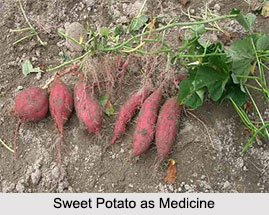 Sweet Potato, botanically named as Batatas Paniculatus is the large tuberous root of this handsome climber is considered tonic, alterative, aphrodisiac, demulcent and lactagogue. The powdered root-stock is given with wine, for the purpose of increasing the secretion of milk.
Sweet Potato, botanically named as Batatas Paniculatus is the large tuberous root of this handsome climber is considered tonic, alterative, aphrodisiac, demulcent and lactagogue. The powdered root-stock is given with wine, for the purpose of increasing the secretion of milk.
Dose of Sweet Potato in Medicine
Sushruta gives several prescriptions for its use as an aphrodisiac. The simplest is as follows. Macerate the powder of the root in its own juice and administer with honey and clarified butter. In the emaciation of children with debility and want of digestive power, the following diet is recommended. Take vidari, wheat-flour and barley equal parts, and make into a confection with milk, clarified butter, sugar and honey.
Vidari enters into the composition of several diuretic and demulcent mixtures. The following is an illustration.
Mutrakrichchhantaka Rasa: Take vidari, fruits of Tribulus terrestris (Gokshura), liquorice root and flowers of Mesua ferrea (nagakesara) in equal parts and prepare a decoction with water. This decoction is given with the preparation of mercury called "Rasasindura", in scanty or acrid urine, to promote this secretion.
This article is a stub. You can enrich by adding more information to it. Send your Write Up to content@indianetzone.com
Related Articles
Ayurveda
History of Ayurveda
Ayurveda Medication
Elements of Ayurveda
Concepts of Ayurveda
Ancient Literature of Ayurveda





